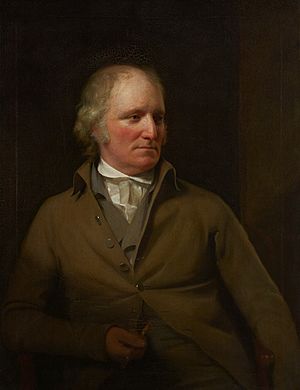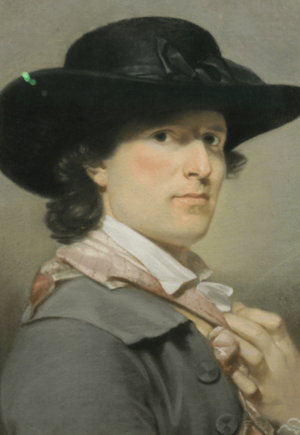Archibald Skirving facts for kids
Quick facts for kids
Archibald Skirving
|
|
|---|---|

|
|
| Born | 1749 Athelstaneford
|
| Died | 1819 Inveresk
|
| Nationality | Britain |
| Occupation | Portrait painter |
| Known for | sketch of Robert Burns |
| Children | yes |
Archibald Skirving (born in 1749 – died on May 19, 1819) was a talented Scottish artist. He was known for painting portraits of people. Archibald was born in a place called Athelstaneford, which is near Haddington in Scotland.
Life of a Portrait Painter
Archibald Skirving was born in Athelstaneford. His father was Adam Skirving. Both Archibald and his father, along with his younger brother Robert, enjoyed writing poetry. However, his father, Adam, was especially famous for writing songs.
Archibald traveled to study art. He learned in big cities like Rome and London. After his studies, he moved to Edinburgh, Scotland. There, he became quite well-known for his portrait paintings. He was especially good at creating portraits using crayons or pastels.
Painting Famous Faces
One of Archibald Skirving's most famous artworks is a pastel portrait of the famous Scottish poet, Robert Burns. Skirving created this portrait partly by looking at another well-known painting of Burns by Alexander Nasmyth. He also used his own memories of meeting the poet in Edinburgh in 1786.
This special portrait of Robert Burns is now part of the National Burns Collection. It is a very important piece of art.
Archibald Skirving painted many other important people too. Some of them include:
- Alexander Carlyle, a church leader from Inveresk
- The mother of Jane Welsh Carlyle, a famous writer
- Gavin Hamilton, who was also an artist
- Professor Dugald Stewart, a well-known philosopher
- John Hunter, who was the head of St. Andrews University
Archibald was known for being a bit unusual. He didn't always work very hard at his art. Later in his life, he would often only paint one picture each year. He charged a high price for his work, about one hundred guineas for each portrait.
Archibald Skirving passed away suddenly in 1819. He was at Inveresk Lodge in Inveresk, East Lothian. He was buried in the churchyard at Athelstaneford. You can see some of his portraits today in the Scottish National Portrait Gallery in Edinburgh.
His Artistic Legacy
Archibald Skirving's paintings are still important today. The National Galleries of Scotland have several of his portraits. These include a painting of his own father and a self-portrait of Archibald himself.
A sculptor named John Henning admired Skirving's work. In 1805, he named one of his sons Archibald Skirving Henning in the artist's honor. This son also grew up to become an artist. Some of his paintings are in public art collections in the United Kingdom.
Family Connections
Archibald Skirving had descendants who became notable. One of them was Robert Scot Skirving (1859-1956). He moved to Australia and became a very respected surgeon there.
 | Janet Taylor Pickett |
 | Synthia Saint James |
 | Howardena Pindell |
 | Faith Ringgold |


